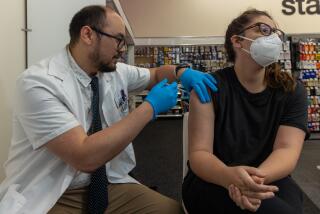Another way the flu could kill — increasing your risk of a heart attack
Not into the flu shot? Think of it as a heart attack vaccine instead.
That’s because the first week or so of a flu infection appears to make you much more susceptible to a heart attack, according to a new study in the New England Journal of Medicine.
The findings are based on 148,307 cases of patients who were tested for influenza. Among all of those tests, 19,729 turned up positive for the flu. And among those cases, there were 332 patients who had at least one heart attack in the year before or after their flu specimen was tested. (The study authors tallied 364 hospitalizations for acute myocardial infarction overall, meaning that some unlucky folks had two or more heart attacks during the two-year observation period.)
Twenty of those heart attacks occurred within one week of a positive flu test. That, of course, was a rate of 20 heart attacks per week.
The other 344 heart attacks happened some other time in the two-year observation period. That worked out to 3.3 heart attacks per week.
That means the risk of a heart attack was six times greater in the first week after flu testing than at other times when the flu was much less likely to be a factor.
The researchers redid their analysis by splitting up that danger week into two parts. They found that heart attack risk was 6.3 times greater during the first three days after a flu test and 5.8 times greater in days four through seven.
About one-quarter of the patients in the study were 65 years old, and the rest were older. When the researchers examined those two groups separately, the link between flu infection and heart attack risk held up only for the older group.
There was no sign of an increased heart attack risk in the rest of the first month after getting a flu test.
The data in the study came from Ontario, Canada, where residents have public health insurance and universal access to medical care. Information on influenza test results came from the Flu and Other Respiratory Viruses Research Cohort, and heart attack hospitalizations were tracked by the Discharge Abstract Database of the Canadian Institute for Health Information.
The researchers, led by Dr. Jeffrey C. Kwong of the University of Toronto, acknowledged that they couldn’t do their analysis based on the date when patients were actually infected with the influenza virus, or when they first began having symptoms, because that information was not available. However, in cases where patients get a flu test, they have typically been sick for only one or two days first.
Also, not all flu cases are severe enough to prompt patients to go and get tested. That means the results of this study may not apply to people with milder illnesses, they added.
The researchers did notice that when flu test results came back positive for certain other kinds of respiratory infections instead of for influenza, there was still an increased (though smaller) short-term risk for heart attacks. That suggests that it’s not the flu itself that’s the problem — it’s the biological impact of a respiratory infection.
For instance, an infection can create conditions that make blood clots more likely to form and cause blood vessels to constrict. Infections also cause inflammation and can reduce blood pressure. All of these are risk factors for a heart attack, Kwong and his colleagues wrote.
The study results suggest that people who want to avoid a heart attack should be sure to get a flu shot — and that doctors and public health officials should encourage them to do so.
“Cardiovascular events triggered by influenza are potentially preventable by vaccination,” the researchers wrote.
Vaccines for other kinds of respiratory infections should be embraced as well, they added. Even simple actions like washing your hands, blocking your cough and keeping germy surfaces clean may reduce your risk of a heart attack.
Follow me on Twitter @LATkarenkaplan and “like” Los Angeles Times Science & Health on Facebook.
MORE IN SCIENCE
Military families bolster the case that obesity is indeed contagious
Less smartphone time equals happier teenager, study suggests
Scientists smash thousands of proteins to find four ‘Legos of life’







